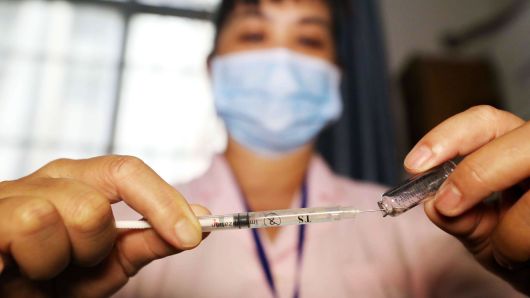Vaccine scandals taint Beijing's ambition to become a global pharmaceutical powerhouse
27 July, 2018

Recent scandals about substandard pharmaceutical drugs will likely jeopardize Beijing's ambitions to become a international pharma leader — even as Chinese President Xi Jinping's government seeks to quell public anger.
The current furor erupted after a rabies vaccine for humans manufactured by Changchun Changsheng Biotechnology — one of China's largest vaccine makers — was found to have violated safety standards.
China's drug regulator accused parent company Changsheng Bio-technology of fabricating production and inspection records related to the vaccine, that is regularly given to infants. Changsheng means "long life" in Chinese.
On Tuesday, the chairwoman of Changsheng was placed in criminal detention, along with 14 others involved in the case, state media reported.
While there have been no known reports of people being harmed by the rabies vaccine, Chinese regulators ordered the company to halt production and recall the product amid ongoing investigations. Not only are drugs for the domestic market under scrutiny, products for export are also being closely examined.
Changchun Changsheng was also found to have earlier sold a substandard vaccine for diphtheria, whooping cough and tetanus.
The recent events sent the stock price of Changsheng plunging. It lost over half of its value since mid-July. Health-care stocks across the board were also hit.
"The latest in a litany of food and drug safety scares, the Changsheng case has sparked both intense criticism of the Chinese government’s ability to regulate the space at home, and concerns about China’s recent push to market pharmaceuticals abroad," said Viola Rothschild, a research associate in Asia Studies at the Council on Foreign Relations.
China was the world’s second-largest health-care market in 2017 — worth $122.6 billion, according to IQVIA, a health-care information company. It is also the biggest emerging market for pharmaceuticals with growth tipped to reach $145 billion to $175 billion by 2022.
Earlier this month, China’s Zhejiang Huahai Pharmaceutical said it was recalling a heart drug sold in the United States after the European Medicines Agency found that it was tainted with a substance linked to cancer.
Such incidents could hamper the sector, which is part of Beijing's "Made in China 2025" industry plan, an ambitious initiative for the country to become a global leader in technology.
"Chinese manufacturers (across all sectors) have worked hard to shake the conception that 'Made in China' is synonymous with 'low quality,' but incidents like these undermine trust and are a reminder that despite recent reforms and advancements, safety and testing requirements in China are not up to international standards," Rothschild wrote in blog post published on Tuesday.
The recent scandals also came a little more than two years after police in Shandong province said they had uncovered the illegal sale of vaccines worth nearly $90 million.
China's urgent need for safe, affordable drugs
The recent scandals have spread doubts about the Chinese pharmaceutical industry and riled a populace frustrated with having to worry about the safety of everyday products.
The drug scandals follow years of problems in China’s food business, which has been plagued with claims of tainted milk and fake eggs.
On Chinese social media, many vented their anger and questioned the effectiveness of the country's regulations regarding food and drug safety.
State media lambasted the breach while senior government officials vowed stern action.
Xi even took time out during state visits to several African countries to order a "thorough investigation" into the "illegal vaccine production case," reported the powerful Chinese Communist Party-owned People’s Daily.
Xi described the case as “hideous and appalling” and said the punishment should be severe, reported People’s Daily.
The vaccine scandals in China came on the back of another controversial health-care debate in the country. The issue has centered on the needs of patients who cannot afford expensive patented medication, underscoring growing health-care concerns in a country with a rapidly aging population.
The hot button topic came to the forefront of Chinese public attention from an unlikely source: top-grossing film “Dying to Survive." The box office hit was loosely based on the real-life exploits of a cancer patient jailed for leading a group that illegally imported cheap generic drugs from India.
TAG(s):
